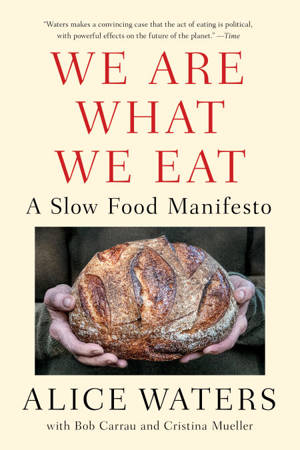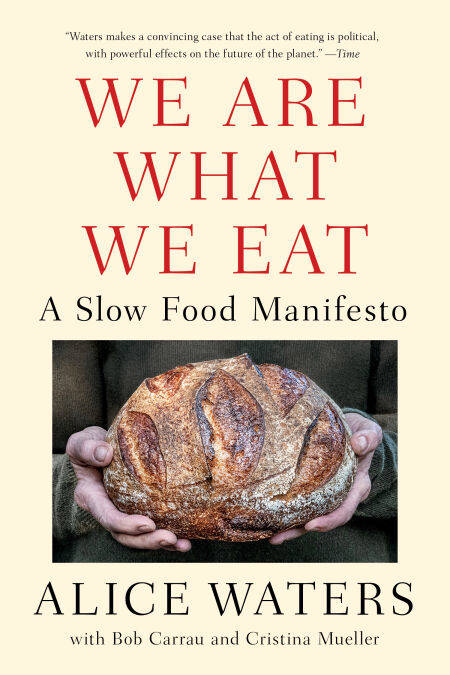
- Retrait en 2 heures
- Assortiment impressionnant
- Paiement sécurisé
- Toujours un magasin près de chez vous
- Retrait gratuit dans votre magasin Club
- 7.000.0000 titres dans notre catalogue
- Payer en toute sécurité
- Toujours un magasin près de chez vous
5,77 €
+ 5 points
Format
Description
From chef and food activist Alice Waters, an impassioned plea for a radical reconsideration of the way each and every one of us cooks and eats
In We Are What We Eat, Alice Waters urges us to take up the mantle of slow food culture, the philosophy at the core of her life’s work. When Waters first opened Chez Panisse in 1971, she did so with the intention of feeding people good food during a time of political turmoil. Customers responded to the locally sourced organic ingredients, to the dishes made by hand, and to the welcoming hospitality that infused the small space—human qualities that were disappearing from a country increasingly seduced by takeout, frozen dinners, and prepackaged ingredients. Waters came to see that the phenomenon of fast food culture, which prioritized cheapness, availability, and speed, was not only ruining our health, but also dehumanizing the ways we live and relate to one another.
Over years of working with regional farmers, Waters and her partners learned how geography and seasonal fluctuations affect the ingredients on the menu, as well as about the dangers of pesticides, the plight of fieldworkers, and the social, economic, and environmental threats posed by industrial farming and food distribution. So many of the serious problems we face in the world today—from illness, to social unrest, to economic disparity, and environmental degradation—are all, at their core, connected to food. Fortunately, there is an antidote. Waters argues that by eating in a “slow food way,” each of us—like the community around her restaurant—can be empowered to prioritize and nurture a different kind of culture, one that champions values such as biodiversity, seasonality, stewardship, and pleasure in work.
This is a declaration of action against fast food values, and a working theory about what we can do to change the course. As Waters makes clear, every decision we make about what we put in our mouths affects not only our bodies but also the world at large—our families, our communities, and our environment. We have the power to choose what we eat, and we have the potential for individual and global transformation—simply by shifting our relationship to food. All it takes is a taste.
In We Are What We Eat, Alice Waters urges us to take up the mantle of slow food culture, the philosophy at the core of her life’s work. When Waters first opened Chez Panisse in 1971, she did so with the intention of feeding people good food during a time of political turmoil. Customers responded to the locally sourced organic ingredients, to the dishes made by hand, and to the welcoming hospitality that infused the small space—human qualities that were disappearing from a country increasingly seduced by takeout, frozen dinners, and prepackaged ingredients. Waters came to see that the phenomenon of fast food culture, which prioritized cheapness, availability, and speed, was not only ruining our health, but also dehumanizing the ways we live and relate to one another.
Over years of working with regional farmers, Waters and her partners learned how geography and seasonal fluctuations affect the ingredients on the menu, as well as about the dangers of pesticides, the plight of fieldworkers, and the social, economic, and environmental threats posed by industrial farming and food distribution. So many of the serious problems we face in the world today—from illness, to social unrest, to economic disparity, and environmental degradation—are all, at their core, connected to food. Fortunately, there is an antidote. Waters argues that by eating in a “slow food way,” each of us—like the community around her restaurant—can be empowered to prioritize and nurture a different kind of culture, one that champions values such as biodiversity, seasonality, stewardship, and pleasure in work.
This is a declaration of action against fast food values, and a working theory about what we can do to change the course. As Waters makes clear, every decision we make about what we put in our mouths affects not only our bodies but also the world at large—our families, our communities, and our environment. We have the power to choose what we eat, and we have the potential for individual and global transformation—simply by shifting our relationship to food. All it takes is a taste.
Spécifications
Parties prenantes
- Auteur(s) :
- Editeur:
Contenu
- Nombre de pages :
- 208
- Langue:
- Anglais
Caractéristiques
- EAN:
- 9780525561545
- Date de parution :
- 31-05-21
- Format:
- Ebook
- Protection digitale:
- Adobe DRM
- Format numérique:
- ePub

Seulement chez Librairie Club
+ 5 points sur votre carte client de Librairie Club
Les avis
Nous publions uniquement les avis qui respectent les conditions requises. Consultez nos conditions pour les avis.





